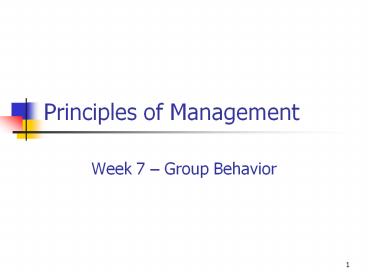Principles of Management - PowerPoint PPT Presentation
1 / 15
Title:
Principles of Management
Description:
Role conflict: experiencing differing role expectations ... Acceptable standards or expectations that are shared by the group's members. ... – PowerPoint PPT presentation
Number of Views:306
Avg rating:3.0/5.0
Title: Principles of Management
1
Principles of Management
- Week 7 Group Behavior
2
Stages in Group Development
- Forming
- Members join and begin the process of defining
the groups purpose, structure, and leadership. - Storming
- Intragroup conflict occurs as individuals resist
control by the group and disagree over
leadership. - Norming
- Close relationships develop as the group becomes
cohesive and establishes its norms for acceptable
behavior.
- Performing
- A fully functional group structure allows the
group to focus on performing the task at hand. - Adjourning
- The group prepares to disband and is no longer
concerned with high levels of performance.
3
Exhibit 152 Stages of Group Development
4
Social Role
- Role
- The set of expected behavior patterns attributed
to someone who occupies a given position - Role conflict experiencing differing role
expectations - Role ambiguity uncertainty about role
expectations
5
Group Norms
- Norms
- Acceptable standards or expectations that are
shared by the groups members. - Common types of norms
- Effort and performance
- Output levels, absenteeism, promptness,
socializing - Dress
- Loyalty
6
Group Conformity
- Conformity
- Individuals conform in order to be accepted by
groups. - Groupthink
- The extensive pressure of others in a strongly
cohesive or threatened group that causes
individual members to change their opinions to
conform to that of the group.
7
Group Size
- Small groups
- Complete tasks faster than larger groups.
- Large groups
- Solve problems better than small groups.
- Are good for getting diverse input.
- Social Loafing
- The tendency for individuals to expend less
effort when working collectively than when work
individually.
8
Group Cohesiveness
- Group Cohesiveness
- The degree to which members are attracted to a
group and share the groups goals.
9
Exhibit 155 The Relationship Between
Cohesiveness and Productivity
10
Group vs. Individual Decision Making
- Advantages
- Generates more complete information and
knowledge. - Generates more diverse alternatives.
- Increases acceptance of a solution.
- Increases legitimacy of decision.
- Disadvantages
- Time consuming
- Minority domination
- Pressures to conform
- Ambiguous responsibility
11
Exhibit 156 Group versus Individual
Decision Making
12
Group Conflict
- Conflict
- Traditional view conflict must be avoided.
- Human relations view conflict is a natural and
inevitable outcome in any group. - Interactionist view conflict can be a positive
force and is absolutely necessary for effective
group performance. - Functional conflicts are constructive.
- Dysfunctional conflicts are destructive.
13
Group Conflict
- Types of Conflict
- Task conflict content and goals of the work
- Relationship conflict interpersonal
relationships - Process conflict how the work gets done
14
Exhibit 158 Conflict and Group
Performance
15
Exhibit 159 Conflict-Management
Source Adapted from K.W. Thomas, Conflict and
Negotiation Processes in Organizations, in M.D.
Dunnette and L.M. Hough (eds.) Handbook of
Industrial and Organizational Psychology, vol. 3,
2d ed. (Palo Alto, CA Consulting Psychologists
Press, 1992), p. 668. With permission































